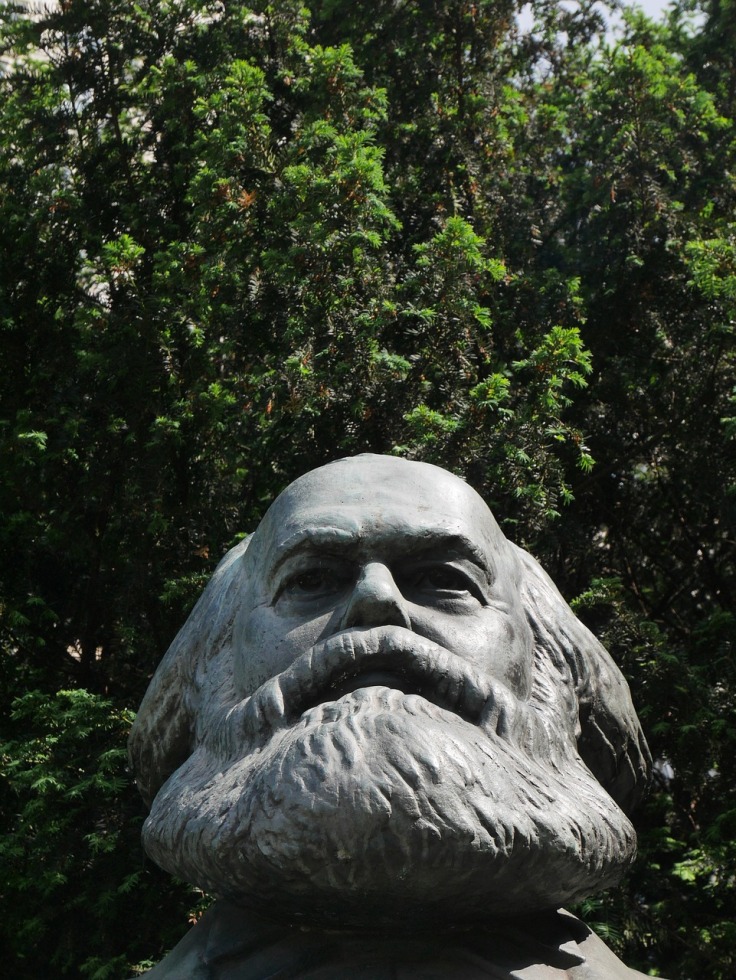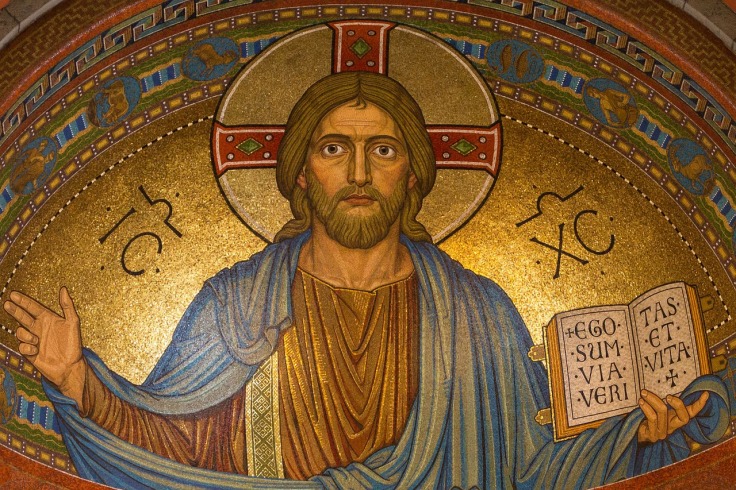
“It would be easier, where property is well secured, to live without money than without poor; for who would do the work?” (Marx and Engels 162)These words do not belong to Karl Marx but he did quote them in his book The Communist Manifesto. Capitalism according to Marx is an oppressive system that simply bolsters the wealth of the capitalists. In communism, redistribution of wealth occurs avoiding the inequalities created by capitalism. On the other hand, communism has led to totalitarian governments much more oppressive than capitalism. This dichotomy arises from the presuppositions entailed by both systems. One depends upon a religious and more specifically a Christian framework. The other system entails atheism and rejects religion as a tool of the oppressors. Capitalism entails Christian presuppositions that provide the impetus for self-interest while communism entails the dialectical materialism of Marx.
In contradistinction to many capitalists, the implicit Christian principles call for wealth redistribution. The continued secularization of American culture has created a free market without the Christian conscience that previously addressed injustice and poverty. An economic theory much closer to Marxism will fill the void space and replace capitalism unless advocates of a market economy return to the Christian principles that address injustice and poverty created by capitalism. Marxism has no such conscience and the vacuous removal of God leads to coercive redistribution of wealth at the hands of the state instead of the church. If we are to save capitalism, those who claim to be following in the Judeo-Christian tradition must voluntary participate in helping the poor or in popular parlance redistributing wealth.
Philosophers and economists generally agree that Adam Smith is the founder of capitalism and is responsible for the first modern theory of economics. The supposition that he is without disputation at least partially responsible for our system, that is for capitalism is widely accepted. Adam Smith was well educated and trained as a philosopher. Thus, the system that we know as capitalism is at bottom a philosophical system. The axiom upon which this philosophical system rests is theistic and implicitly Christian. Whether or not Adam Smith was, a committed Christian is a subject of continued scholarly debate however; his own writings acknowledge the presence of a deity.
Smith writes, “Man is accountable to God and his fellow creatures. But tho’ he is, no doubt, principally accountable to God, in the order of time, he must necessarily conceive himself as accountable to his fellow creatures,” (Smith 130). These words penned by Smith acknowledge that man is subject to humanity as well as his creator. One of the hallmarks of Smith’s philosophy is his virtue ethics. The cultivation of virtues such as kindness and charity was the primary concern of much that Smith wrote. One of Smith’s works quoted above was entitled The Theory of Moral Sentiments and in this book; Smith outlines the moral presuppositions that will form the framework for his economic theory.
The founder of capitalism may have been concerned with virtue however, for many modern day capitalists the only virtue that is important is the virtue of selfishness. Modern day followers of Ayn Rand assert, “Money is the root of all good” (Rand) and are much more interested in the virtue of selfishness. Capitalism has empirically demonstrated that as a system of economics it is capable of generating great wealth. The wealth-creating engine of capitalism devoid of Christian principles is inclined toward inequality. The gulf between poverty and wealth continues to increase. Unfortunately many people have faulty notions regarding the essence of poverty. Recently R. Edward Freeman wrote, “The very idea of capitalism reinforces the notion that some are meant to be poor and some are meant to be rich” (Freeman) He notes that we fall into the dichotomy of either assuming that people’s only hope is the market economy or a government policy of wealth redistribution.
In addition to the economic inequality created by capitalism the United States is decidedly secularized. Formerly, charitable activities of religious groups counterbalanced the dichotomy of wealth and poverty. American society has shifted away from a theological grounding of morality into something all together different. The following quote from Francis Ryan in an article entitled Christianity and American Education illustrates the nature of the paradigmatic change “in a democratic society morality is shifted from the level of theological doctrine to the level of social relationships” (Ryan). Man was previously concerned with the well-being of his neighbor because it was his duty toward God. If the above quote is correct, the shift that has occurred makes one much less likely to consider those outside their direct sphere of influence. Thus, the plight of the impoverished is not tantamount to a person’s spiritual life.

The absence of God creates a void space. The uncomfortable truth is capitalism without God is unsustainable. In contradistinction to capitalism, the system formulated by Karl Marx depends upon and presupposes atheism. Vladimir Lenin, the noted Russian Marxist and Communist made this assertion regarding religion “Every religious idea, every idea of God, even flirting with the idea of God, is unutterable vileness” (Noebel 68). A fully developed Marxism required the eradication of God and religion. Marxism replaces God with something known as dialectical materialism. Essentially this is the doctrine that man is matter; meaning of course that man is not comprised of spirit. Materialists have no room for God who is by definition incorporeal.
There is a strong connection between Marxism and the theory of evolution. Unfortunately, the exegesis of such a connection would take precious time and space. Altruism as a component of both Darwinian evolution and atheism is non-sequitar. Atheist philosopher David Stove says that altruism “is an attribute which disposes its possessor to put the interests of others before its own” (Stove 184).The confluence of atheism and evolution precludes such a concern for others. In addition to the overthrow of religion, Marxism depends upon the loss of individual or market freedom. In capitalism, the markets dictate the means of production and the supply drives demand. Some level of planning is present even in capitalism. Carmen Haider wrote an article entitled The Meaning of Economic Planning and points out planning entails an effort by a group of people that has a common end and purpose. (Haider) Using this definition as our guide it is easy to see that businesses employ planning nearly every day. However, planning in capitalism relies on the principles of freedom, supply, and demand.
On the other hand, a Socialist or Marxist economic system depends upon central planning. “Economic decisions regarding price, production, consumption, etc. are made by central planners affiliated with the government, whereas in capitalism, economic decisions are made by every producer and every consumer” (Noebel 679). By logical necessity, central planning depends on someone other than the consumer. This entails a fundamental loss of freedom over the market and free consumer choice. The lack of private property and the lack of consumer choice remove liberties. The unequivocal revocation of freedom is a ramification of a centrally planned economy. This is neither hyperbolic nor overstatement but the stark reality.
The coalescences of secularization and market-caused inequality coupled with the general apathetic attitudes of religious and non-religious people create the perfect void space. In more popular parlance, this means that our society has rejected the notion of God. As previously conveyed, Marxism depends on just such a confluence. In North America, secular humanism has catapulted this rejection of God into near light-speed. Evangelical scholar, theologian, and philosopher Carl F.H. Henry noted that secular humanism “disavows a transcendent deity as promotive of an arbitrary or despotic authority, and as an intolerable barrier to human freedom” (Henry)
The loss of transcendent values is the loss of Christianity itself. A lack of authority creates the void space. One author mentions that every age has been post-Christian but the culture was still decidedly Christian. This culture however is post-Christian in both senses. Consider this extended quote from author Gabriel Vahanian
Every age is post-Christian. But this has been true only theologically speaking; until modern times the formative tradition of Western culture has been continually imbued with the spirit of Christianity. Regardless of how approximately, our culture has been a variation on the translation of this spirit into the arts and the sciences, into a style of life. But the novelty, or tragedy, of our situation lies in the fact that our age is post-Christian both theologically and culturally. (Vahanian 229)
The situation is dramatically different and tragically dire. The loss of transcendent values both culturally and theologically is just the catalyst needed for drastic cultural change. The panacea of secularization must be either revival or replacement. The ancient forms and culture of Christian societies need revived so that self-interested capitalism has the necessary limiting factors or proto-Marxism will replace our economic and spiritual way of life.
The secularization of America argument has merit. The signs point to a continued decline in church membership and a rise of atheism. Despite this, the question remains can Christians rescue capitalism. While the antecedent does not require further explication, those faithful that remain have an enormous task. Nothing less than the salvation of our economic system will do. The failure to succeed in this task spells not only the end of the church but also the end of our way of life.
The intention is not to be doom-and-gloom or engage in prescient apocalyptic double speak. Rather, the point is to encourage a radical reappraisal of the nature of religion and economics. The church universal, meaning generically believers in God and specifically Christians, must accept a painful proposition. The proposition that the church must accept is its own blindness toward the plight of the poor. Furthermore, the church must acknowledge that capitalism creates inequalities. This is not to say that capitalism is inherently corrupt or that Marxism is somehow superior, neither of these premises is true. Acknowledging that something is not perfect does not necessarily entail the replacement of the some-thing. Religious people do need to grapple with the plight of the impoverished and resist the temptation to pretend that every single American is affluent.
Christians and those in the Judeo-Christian tradition are still free to choose how they spend their money. The real distinction is between coercive and free distribution of wealth. Coercive redistribution essentially entails taking someone’s wealth and giving it to another. Conversely, if believers of all stripes would do this voluntary the effects would be immediate. The implicit connection between people of faith and free markets should be apparent. The only viable alternative to free market economies on a large scale that would adequately feed and clothe the poor is Marxism. As previously mentioned Marxism depends upon the eradication of the immaterial and has no room for God. Either the instruments of poor relief reside in the hands of the government or they lie with those who claim to have faith. Perhaps some third way exists that would bridge these extremes but if man has learned anything from anthropology it is that human have a proclivity for extremes.
No matter where a person stands with respect to issues of social justice, one thing should be certain; Americans are fond of their liberties. The notion of free will while not philosophically tenable is the collective consciousness of most Americans. The logical conclusion is that coercive redistribution is inferior to voluntary redistribution. Much of this depends upon the modern day church and people of faith acknowledging the necessity of helping those finding themselves to be less fortunate.
The Christian response to poverty should be born from biblical principles. The New Testament book of James gives a clear warning to those who claim to be followers of Jesus and do not care for the poor. James says that the people who are not caring for the poor have a “dead” faith that unconnected with the God they seek to serve. In fact in some sense, the bible calls for voluntary redistribution of wealth. The book of Exodus provides instructions to the wealthy regarding caring for the poor. This doctrine of extending care to the less fortunate extends into the New Testament. In the book of Acts, the early church embraced a form of voluntary wealth distribution to members of the community.
A book review that appeared in the journal entitled Thought noted that Christian charity is a fundamental part of the Christian life. Consider this quote “Christian Charity is a mission from God to the world, a ca11 to special discipleship and following of the Lord.” Charity and justice are among the prime directives for those in the Judeo Christian tradition. The Christian response to poverty is a calling from God to move into the world and help alleviate suffering. However, there is an important distinction between justice and charity. Christians have begun to shift their thinking from charity to issues of justice. This change is subtle but it entails going beyond mere generosity extended to the poor from the rich. Justice demands that the poor have some level of access to the wealth generating historically reserved for rich nations (Partridge).

Hypothetically, an objection could be proffered regarding the myopia of only considering the Christian tradition. This has less to do with an exclusivist precommitment and more to do with the basic presuppositions of religions outside of Christianity. For instance, a commitment to Karma can do little to engender sympathy as the Hindu is simply paying for his sins from a former existence. This does not mean that Hinduism has no mechanism for dealing with the poor, though it is not the same sort of concern shared by the Christian, Jew, or Muslim. In addition to these concerns, capitalism has been most successful in the West and particularly in the United States. Therefore, the main participants in saving capitalism have to be those fully invested in its success.
Acknowledging the inequalities of Capitalism and the free market economy is difficult. The fact that some do not have as much as another is not to say that the system is inherently flawed. Identifying the flaw, we must acquiesce to the fact that the flaw is with people themselves. This is quite difficult especially when dealing with many of the deep-seated prejudices that are present during the discussion of wealth and poverty. Some would say that the poor are lazy or simply lack the education to get ahead. Others would disagree that their success depended upon the help of others. These attitudes are profoundly troubling when and if they are present among religious people from the upper and middle classes. Embracing a hard dichotomy between financial success and failure only serves to institutionalize poverty and create generational constraints on people’s ability to become financially independent.
Today, many would advocate more regulation of the markets and demonize those who are successful. Unfortunately, in the end, this only punishes those creating employment and opportunity and this often translates to fewer lower wage earners thus perpetuating poverty. Christians living in the United States need to remember that our children are disproportionately affected by the inequalities created by free markets. Dr.Cornel West conveys this sentiment when he writes “A particularly shameful fact is that the United States has the highest percentage of children living in poverty of any rich nation: 20.5 percent, a figure that represents a 36 percent increase since 1970 and compares with 9 percent in Canada, 4 percent in Germany and 2 percent in Japan.” (West 342)
Capitalism is the hallmark of a democratic society and the salvation of capitalism depends upon religious people. In order for the economic presupposition of capitalism to continue, the voluntary redistribution of wealth from those who have abundance to those who are impoverished must increase. The fact that capitalism depends upon a Christian framework is without question, however the question of whether or not we can forestall the death of capitalism is not yet settled. Marxism cannot exist alongside religion. No less a Marxist than Joseph Stalin admitted this premise, therefore the secularization of America is also potentially the end of Capitalism. Much of this depends on the individual religious adherent. If believers accept this mantle and one-by-one religious people see the importance of offsetting the natural inequity implicit in free markets, then perhaps the death knell of Capitalism is premature.
On the other hand, continued inequality and further erosion of morality via secularization will create a vacuum such that Marxism will soon replace Capitalism. What will you do to prevent this from happening? More importantly, we must ask are rich religious believers more interested in money or God.
Works Cited
Burkett, Phillip H. “The State of the Poor .” Thought (1929): 319-325. pdf .
Freeman, R. Edward. “Poverty and the Politics of Capitalism .” The Ruffin Series of the Society for Business Ethics (1998): 31-35. document .
Haider, Carmen. “The Meaning of Economic Planning .” Thought (1933): 101-107 .
Marx, Karl and Friedrich Engels. The Communist Manifesto . New York : Oxford University Press , 1992 .
Noebel, Dr. David. Understanding the Times . Eugene : Harvest House Publishers , 1997.
Partridge, Christopher. Dictionary of Contemporary Religion in the Western World . Downers Grove : Inter Varsity Press , 2002.
Rand, Ayn. Atlas Shrugged . New York : Penguin , 1957.
Ryan, Francis A. “Christianity and American Education .” Thought (1950 ): 562-563. document .
Smith, Adam. The Theory of Moral Sentiments. London : George Bell and Sons , 1892.
Stove, David. Darwinian Fairytales. New York : Encounter , 1995.
Vahanian, Gabriel. The Death of God: The Culture of our Post-Christian Era . New York : George Braziller, 1961.
West, Cornel. The Cornel West Reader. New York: Basic Civitas Books, 1999.
Leave a comment